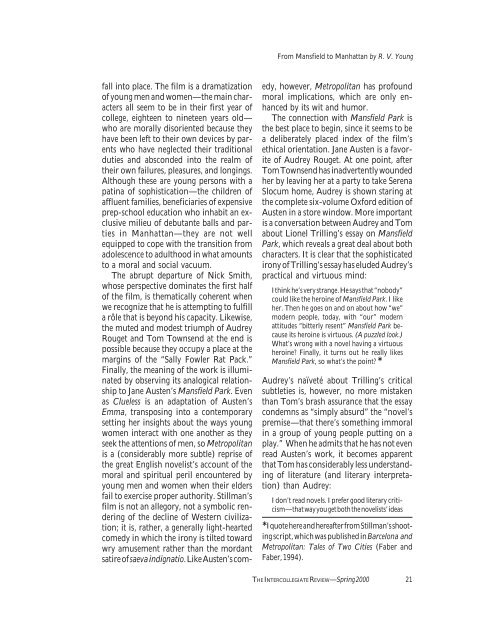From Mansfield to Manhattan: The Abandoned Generation of Whit ...
From Mansfield to Manhattan: The Abandoned Generation of Whit ...
From Mansfield to Manhattan: The Abandoned Generation of Whit ...
You also want an ePaper? Increase the reach of your titles
YUMPU automatically turns print PDFs into web optimized ePapers that Google loves.
fall in<strong>to</strong> place. <strong>The</strong> film is a dramatization<br />
<strong>of</strong> young men and women—the main characters<br />
all seem <strong>to</strong> be in their first year <strong>of</strong><br />
college, eighteen <strong>to</strong> nineteen years old—<br />
who are morally disoriented because they<br />
have been left <strong>to</strong> their own devices by parents<br />
who have neglected their traditional<br />
duties and absconded in<strong>to</strong> the realm <strong>of</strong><br />
their own failures, pleasures, and longings.<br />
Although these are young persons with a<br />
patina <strong>of</strong> sophistication—the children <strong>of</strong><br />
affluent families, beneficiaries <strong>of</strong> expensive<br />
prep-school education who inhabit an exclusive<br />
milieu <strong>of</strong> debutante balls and parties<br />
in <strong>Manhattan</strong>—they are not well<br />
equipped <strong>to</strong> cope with the transition from<br />
adolescence <strong>to</strong> adulthood in what amounts<br />
<strong>to</strong> a moral and social vacuum.<br />
<strong>The</strong> abrupt departure <strong>of</strong> Nick Smith,<br />
whose perspective dominates the first half<br />
<strong>of</strong> the film, is thematically coherent when<br />
we recognize that he is attempting <strong>to</strong> fulfill<br />
a rôle that is beyond his capacity. Likewise,<br />
the muted and modest triumph <strong>of</strong> Audrey<br />
Rouget and Tom Townsend at the end is<br />
possible because they occupy a place at the<br />
margins <strong>of</strong> the “Sally Fowler Rat Pack.”<br />
Finally, the meaning <strong>of</strong> the work is illuminated<br />
by observing its analogical relationship<br />
<strong>to</strong> Jane Austen’s <strong>Mansfield</strong> Park. Even<br />
as Clueless is an adaptation <strong>of</strong> Austen’s<br />
Emma, transposing in<strong>to</strong> a contemporary<br />
setting her insights about the ways young<br />
women interact with one another as they<br />
seek the attentions <strong>of</strong> men, so Metropolitan<br />
is a (considerably more subtle) reprise <strong>of</strong><br />
the great English novelist’s account <strong>of</strong> the<br />
moral and spiritual peril encountered by<br />
young men and women when their elders<br />
fail <strong>to</strong> exercise proper authority. Stillman’s<br />
film is not an allegory, not a symbolic rendering<br />
<strong>of</strong> the decline <strong>of</strong> Western civilization;<br />
it is, rather, a generally light-hearted<br />
comedy in which the irony is tilted <strong>to</strong>ward<br />
wry amusement rather than the mordant<br />
satire <strong>of</strong> saeva indignatio. Like Austen’s com-<br />
<strong>From</strong> <strong>Mansfield</strong> <strong>to</strong> <strong>Manhattan</strong> by R. V. Young<br />
edy, however, Metropolitan has pr<strong>of</strong>ound<br />
moral implications, which are only enhanced<br />
by its wit and humor.<br />
<strong>The</strong> connection with <strong>Mansfield</strong> Park is<br />
the best place <strong>to</strong> begin, since it seems <strong>to</strong> be<br />
a deliberately placed index <strong>of</strong> the film’s<br />
ethical orientation. Jane Austen is a favorite<br />
<strong>of</strong> Audrey Rouget. At one point, after<br />
Tom Townsend has inadvertently wounded<br />
her by leaving her at a party <strong>to</strong> take Serena<br />
Slocum home, Audrey is shown staring at<br />
the complete six-volume Oxford edition <strong>of</strong><br />
Austen in a s<strong>to</strong>re window. More important<br />
is a conversation between Audrey and Tom<br />
about Lionel Trilling’s essay on <strong>Mansfield</strong><br />
Park, which reveals a great deal about both<br />
characters. It is clear that the sophisticated<br />
irony <strong>of</strong> Trilling’s essay has eluded Audrey’s<br />
practical and virtuous mind:<br />
I think he’s very strange. He says that “nobody”<br />
could like the heroine <strong>of</strong> <strong>Mansfield</strong> Park. I like<br />
her. <strong>The</strong>n he goes on and on about how “we”<br />
modern people, <strong>to</strong>day, with “our” modern<br />
attitudes “bitterly resent” <strong>Mansfield</strong> Park because<br />
its heroine is virtuous. (A puzzled look.)<br />
What’s wrong with a novel having a virtuous<br />
heroine? Finally, it turns out he really likes<br />
<strong>Mansfield</strong> Park, so what’s the point? *<br />
Audrey’s naïveté about Trilling’s critical<br />
subtleties is, however, no more mistaken<br />
than Tom’s brash assurance that the essay<br />
condemns as “simply absurd” the “novel’s<br />
premise—that there’s something immoral<br />
in a group <strong>of</strong> young people putting on a<br />
play.” When he admits that he has not even<br />
read Austen’s work, it becomes apparent<br />
that Tom has considerably less understanding<br />
<strong>of</strong> literature (and literary interpretation)<br />
than Audrey:<br />
I don’t read novels. I prefer good literary criticism—that<br />
way you get both the novelists’ ideas<br />
*I quote here and hereafter from Stillman’s shooting<br />
script, which was published in Barcelona and<br />
Metropolitan: Tales <strong>of</strong> Two Cities (Faber and<br />
Faber, 1994).<br />
THE INTERCOLLEGIATE REVIEW—Spring 2000 21
















